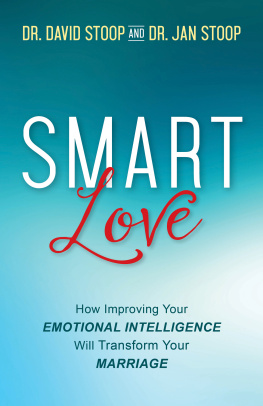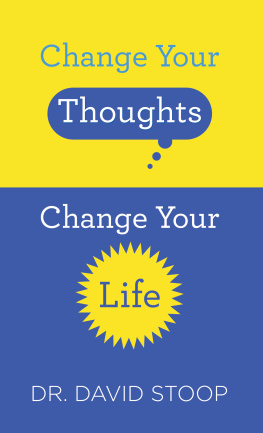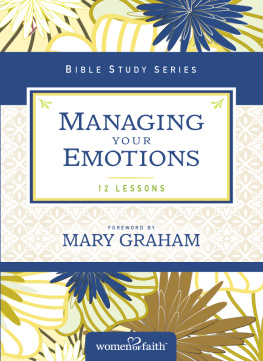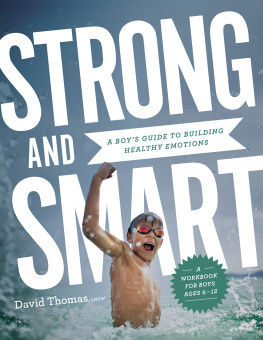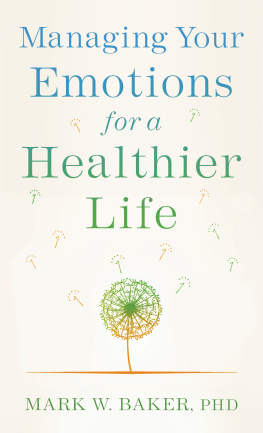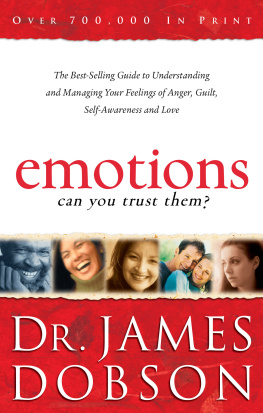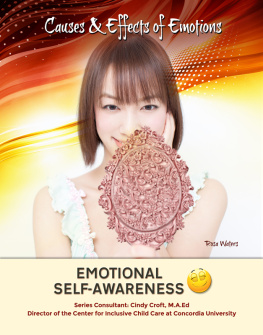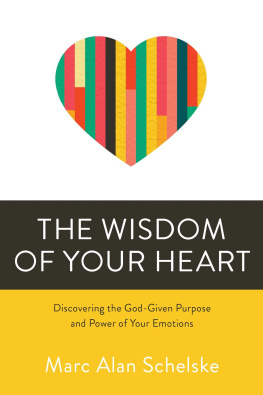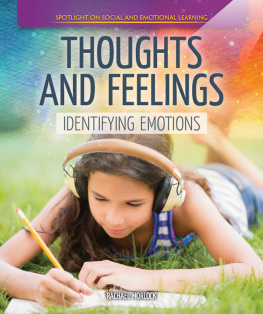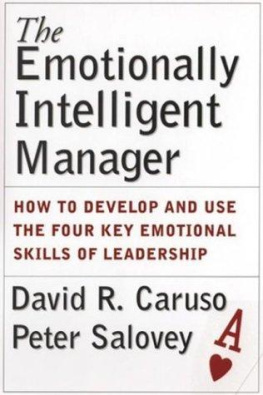Copyright Page
2017 by David and Jan Stoop
Published by Revell
a division of Baker Publishing Group
P.O. Box 6287, Grand Rapids, MI 49516-6287
www.revellbooks.com
Ebook edition created 2017
All rights reserved. No part of this publication may be reproduced, stored in a retrieval system, or transmitted in any form or by any meansfor example, electronic, photocopy, recordingwithout the prior written permission of the publisher. The only exception is brief quotations in printed reviews.
Library of Congress Cataloging-in-Publication Data is on file at the Library of Congress, Washington, DC.
ISBN 978-1-4934-0601-2
Unless otherwise indicated, Scripture quotations are from the Holy Bible , New Living Translation, copyright 1996, 2004, 2015 by Tyndale House Foundation. Used by permission of Tyndale House Publishers, Inc., Carol Stream, Illinois 60188. All rights reserved.
Scripture quotations marked NIV are from the Holy Bible, New International Version. NIV. Copyright 1973, 1978, 1984, 2011 by Biblica, Inc. Used by permission of Zondervan. All rights reserved worldwide. www.zondervan.com
Scripture quotations marked NKJV are from the New King James Version. Copyright 1982 by Thomas Nelson, Inc. Used by permission. All rights reserved.
This publication is intended to provide helpful and informative material on the subjects addressed. Readers should consult their personal health professionals before adopting any of the suggestions in this book or drawing inferences from it. The authors and publisher expressly disclaim responsibility for any adverse effects arising from the use or application of the information contained in this book.
The names and details of the people and situations described in this book have been changed or presented in composite form in order to ensure the privacy of those with whom the authors have worked.
The authors are represented by WordServe Literary Group (www.wordserveliterary.com).
Endorsements
Get ready to improve your love IQ. In this remarkable book, Dave and Jan Stoop give all of us the practical steps for learning how to love SMART. Follow their proven guidance and your love life will never be the same.
Drs. Les and Leslie Parrott , New York Times bestselling authors of Saving Your Marriage Before It Starts
Great marriages are both art and science. Dave and Jan Stoop have integrated both in a highly effective system, using the latest neuroscience, to bring couples more intimacy and happiness. Great concepts and very workable skills. I highly recommend this book.
John Townsend, PhD , New York Times bestselling author of Boundaries ; founder of the Townsend Institute of Leadership and Counseling
In the forest of books on marriage relationships, SMART Love stands tall. Thanks to their years of professional practice, their knowledge of the Bible, the results of recent research on emotional intelligence, and their own vibrant marriage relationship, Dave and Jan have given us a unique and practical resource. The many Action Plans alone are worth the price of the book. No pie-in-the-sky platitudes or superficial solutions, but wise counsel that can make an immediate difference in your marriage.
Gary J. Oliver, ThM, PhD , executive director of the Center for Healthy Relationships; professor of psychology and practical theology at John Brown University; coauthor of Mad About Us
Contents
Cover
Title Page
Copyright Page
Endorsements
Introduction
1. What Is SMART Love?
2. The Land of Emotions
3. The SMART Love Inventory
4. S Self-Awareness
5. Self-Awareness Action Plans
6. M Managing Your Emotions
7. Managing Your Emotions Action Plans
8. A Accountability
9. Accountability Action Plans
10. R Reading the Other Persons Emotions
11. Empathy Action Plans
12. T Together in the Land of Emotions
13. Together Emotionally Action Plans
14. What about Love?
Notes
About the Authors
Books by David and Jan Stoop
Back Ads
Back Cover
3
The SMART Love Inventory
As we mentioned in chapter 1, SMART Love is based on five competencies: (1) becoming self-aware of your emotions; (2) managing your emotions; (3) accountability to yourself, your spouse, and others; (4) reading the other persons emotions; and (5) learning to live together in the land of emotions.
The first two competencies are skills we develop within ourselves; they are personal skills. The third relates to how comfortable we are emotionally with friends. The other two skills are interactive and interpersonal skills that we develop by building on the first three.
Below is an inventory to help you know how skillful you are at this point in experiencing and expressing SMART Love. Make a photocopy so you and your spouse can each take the inventory. (Note: You can also take the inventory free of charge at www.smartlove.us.)
This inventory will ask you to respond to a statement that describes your typical behavior. Take your time to get a clear picture of what the statement is saying, then answer as honestly as you can, thinking in terms of how you are most of the time. There are no never or always answers, so that makes it easier to think in terms of mostly .
As you respond to each statement, think of it in general terms. Dont think of it as describing something that happened in a specific situation two days ago.
The scoring is based on three responses. Make your choice by entering the number 3 for usually, 2 for sometimes, and 1 for seldom. In the first column, answer in terms of how you see yourself. In the second column, answer in terms of how you see your spouse.
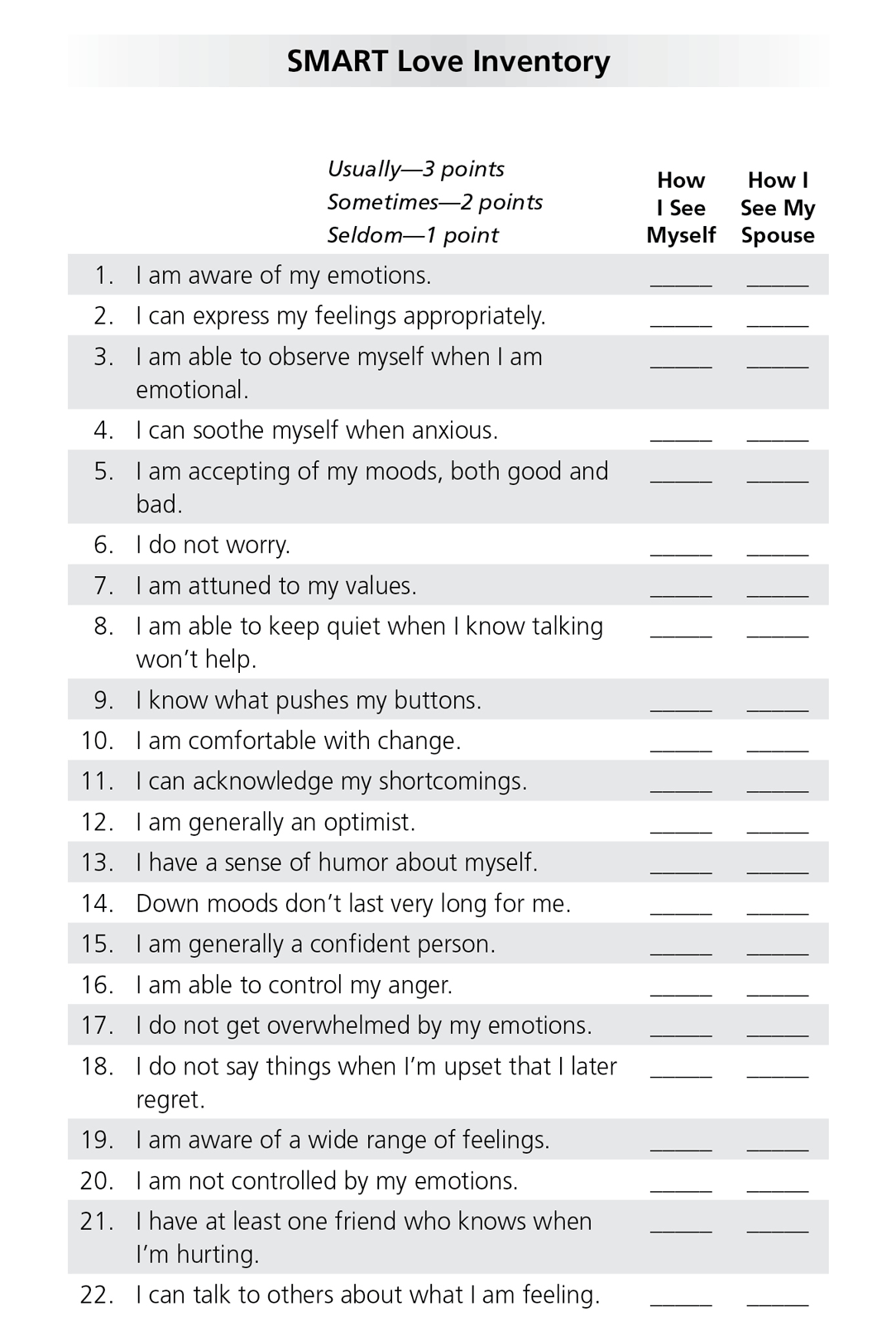
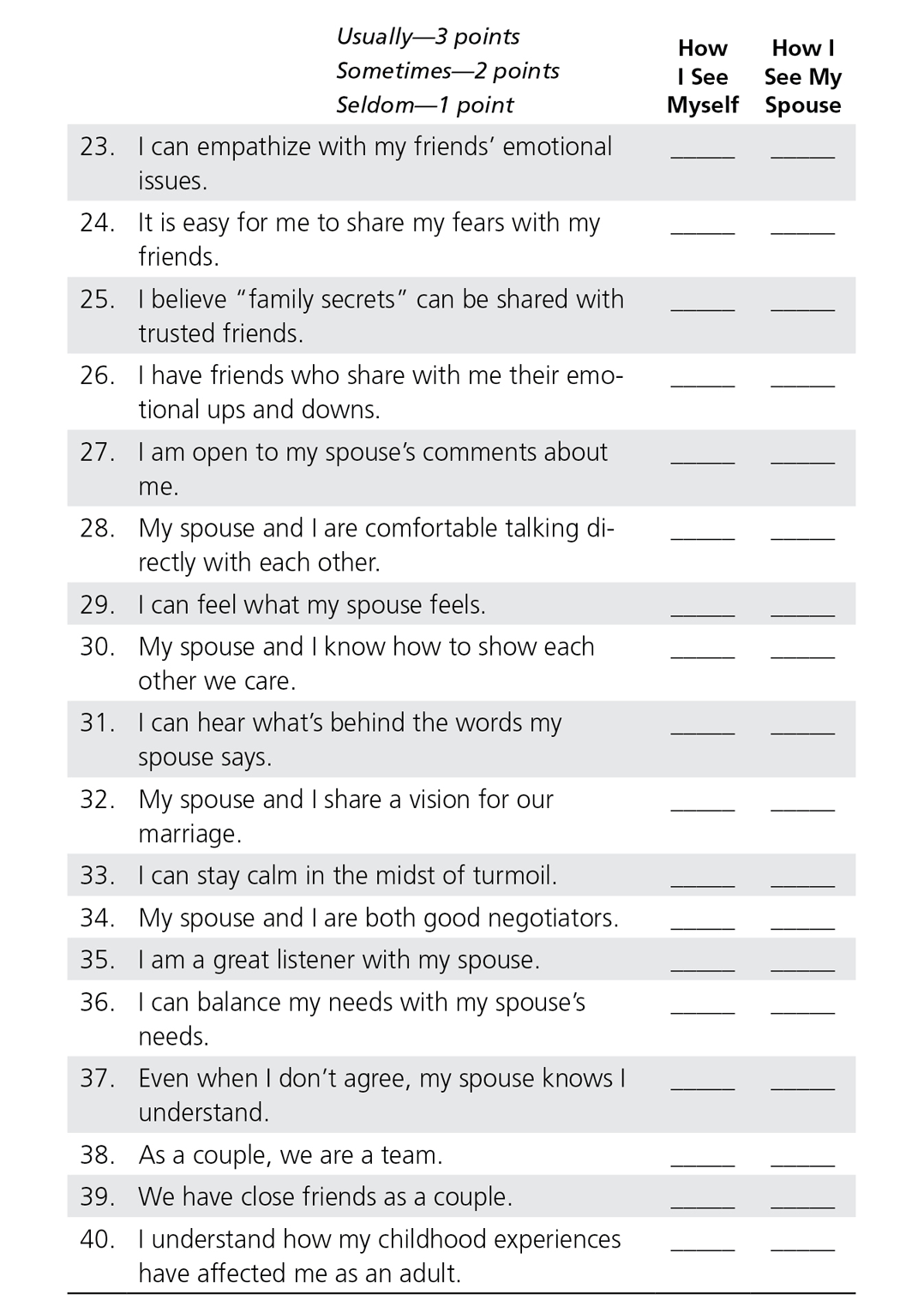
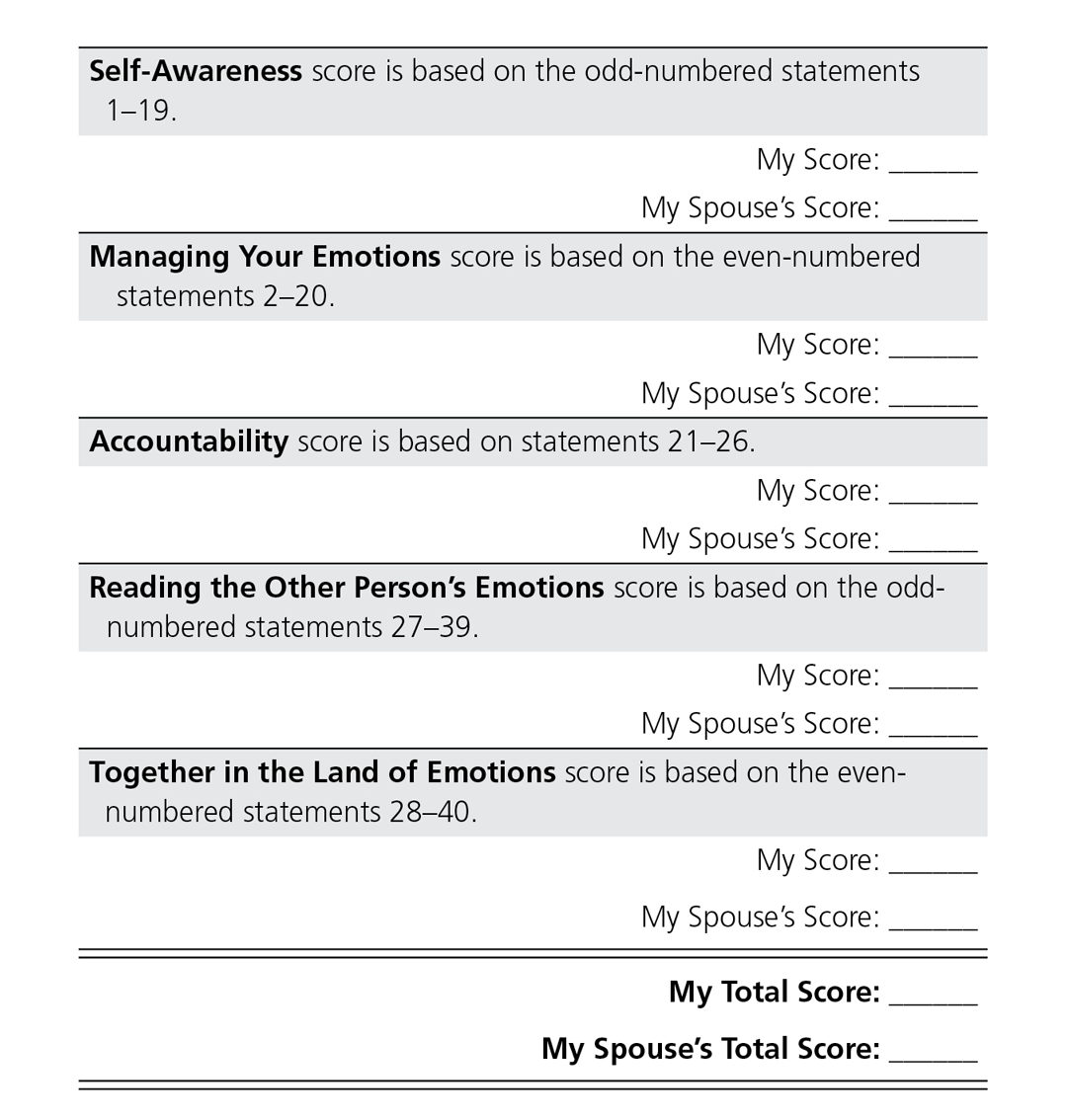
The lowest possible total score is 40 points, and the highest possible score is 120 points. If you scored a total of 60 or less, you have your work cut out for you. You may even work hard at avoiding feeling emotions. If you scored between 60 and 90, youre somewhat comfortable with some emotions but avoid others. If you scored over 90, then you probably are comfortable with your emotional words and pretty much know the emotional landscape.
Now that youve scored your inventory, share all of your scores with your spouse. Remember, you are embarking together on the journey to develop SMART Love, so youre going to need to work through this process together.
However, be careful as you share how you scored each other. When you hear your spouses score and compare it to how you scored him or her, you may think, That cant be! Your spouse is probably thinking the same thing about your scores. So dont even go there! Its important to remember that everyone has a tendency to overestimate their own abilities when it comes to their emotions and to underestimate their spouses.
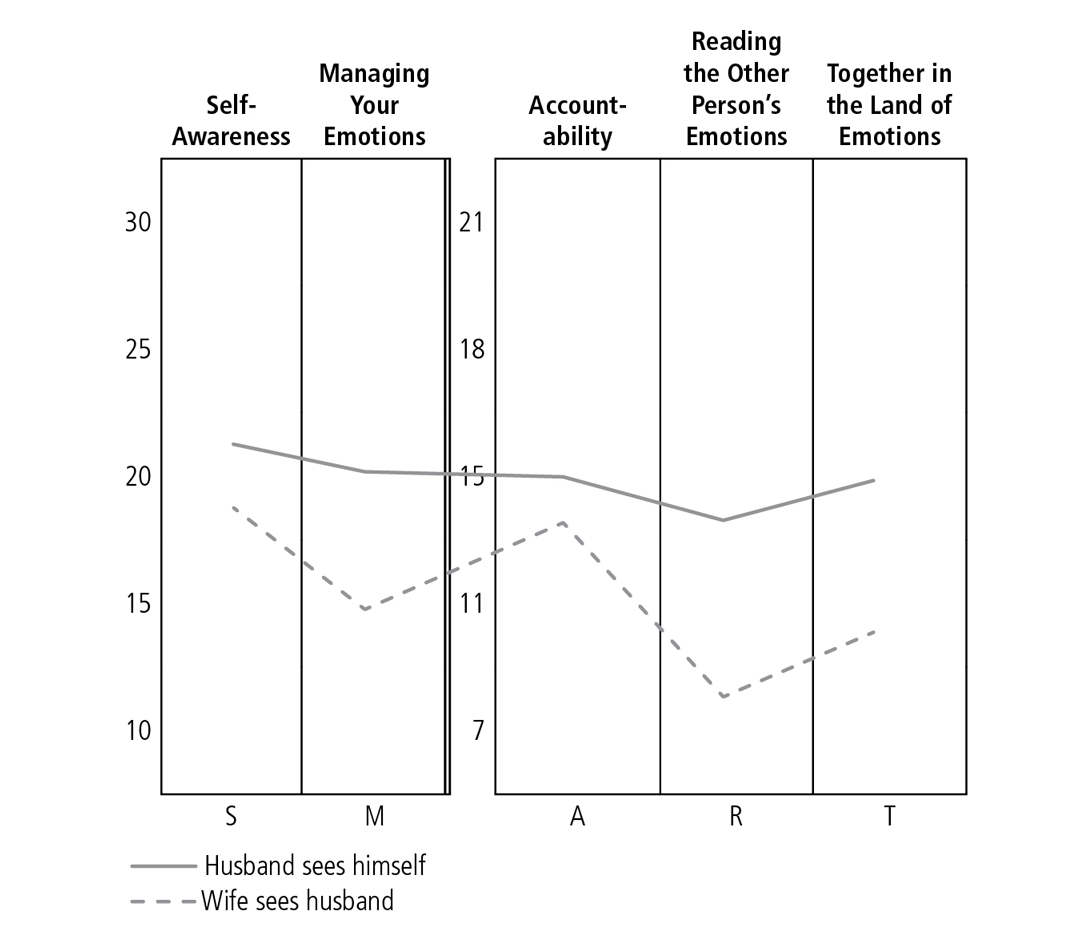
Following the example above, plot your scores on the graph on the next page, using one color to show how you scored yourself and a different color to show how your spouse scored you. Have your spouse do the same. For example, if you scored 19 on Self-Awareness, place a dot at the approximate value of 19. If you scored 15 on Managing Your Emotions, place a dot at the approximate value of 15. Do the same with Accountability, Reading the Other Persons Emotions, and Together in the Land of Emotions.

